Medicine Scarcity Hitting New Highs In Iran As Subsidy Stops
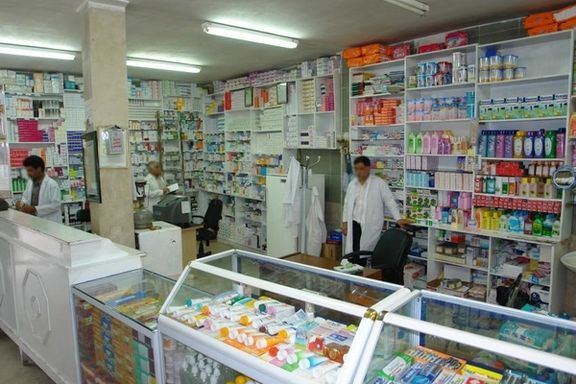
A senior official in Iran says shortages of medications will reach an alarming level in the upcoming months if foreign currency is not provided for imports.

A senior official in Iran says shortages of medications will reach an alarming level in the upcoming months if foreign currency is not provided for imports.
The director-general of Drugs and Controlled Substances Department of Iran’s Health Ministry, Heidar Mohammadi, said on Saturday that about 200 essential medicines and pharmaceutical products would not be available in Iran in the next three months.
Noting that the number of unavailble drugs is about 40 at the moment, he warned that, unless the government provides cheap dollars, the list of unavailable drugs would hit 400 to 500 in the near future.
The administration of President Ebrahim Raisi has moved to eliminate cheap dollars for imports of essential goods as the impact of the US sanctions are crippling the Islamic Republic’s economy.
Just before the US pulled out of the 2015 nuclear agreement (JCPOA) in May 2018, the former Iranian president Hassan Rouhani decided to offer dollars at 42,000 rials for essential imports to keep food and medicine cheap. However, the subsidized dollars did little to keep prices low, simply due to the corruption ingrained in Iran’s supply chain. There are numerous cases of companies applying to receive the cheap dollars to import essential commodities but pocketed huge profits by importing luxury goods, such as thousands of foreign cars.
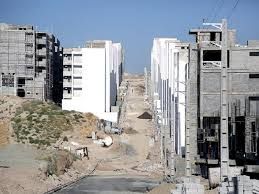
Iran is negotiating with Chinese and Turkish companies for building affordable government housing in a possible oil barter deal oil, an official said on Saturday.
Iran’s President Ebrahim Raisi (Raeesi) has promised to build one million apartment every year, during his four-year term to solve rising housing costs for ordinary Iranians squeezed by high inflation and a worsening economic crisis.
Ahmad Donyamali, a member of the state housing council told the Iranian Labour News Agency (ILNA) that the government is in talks with Chinese, Turkish and even a European company for contracting out part of the construction job and pay for it in oil.
News about Chinese companies participating in the construction project emerged in October but it was swiftly denied at the time.
Tehran faces two impediments in contracting with foreign firms. The first hurdle is to pay for goods and services amid a US banking sanction that threatens foreign banks with third-party sanctions if they deal with Iran. The second problem is lack of foreign currency.
US oil sanctions have substantially reduced Iran’s dollar earnings since 2018, forcing the country to dip into its foreign currency reserves, which observers say declines substantially in three years, although they might have marginally recovered this year.
An oil barter deal might specially work for Chinese companies that already import Iranian oil under the radar of US sanctions.
However, the promise to build 4 million apartments in 4 years amid an economic crisis might be more of a wish than a reasonable project for Iran.
Nuclear talks with the United States that could help lift sanctions are stalled at the moment and the outlook for Iran’s economy is bleak. The national currency that has declined tenfold in four years might dip to unprecedented lows if sanctions continue for another year.
The US has threatened to tighten the application of sanctions. Diplomats visited the United Arab Emirates this week to pursue the issue of actors in the region abiding by the US sanctions.
Donyamali, without naming any companies, said that negotiations have proven foreign firms are offering much better prices than their Iranian counterparts. A price of $100 per square meter ($9 per sqf) has been offered for building cheap, prefab apartment buildings. This means more than a $24 billion investment for 4 million apartments, money that Iran does not have now. He emphasized that Iran’s position is not pay any cash to foreign companies and is basing the talks on the principle of oil barter.
Iranian companies are asking almost double of what foreign firms are ready to accept, Donyamali said. Most Iranian companies in such a large project would be state or quasi-sate entities, some possibly linked with the Islamic Revolutionary Guard Corps, IRGC.
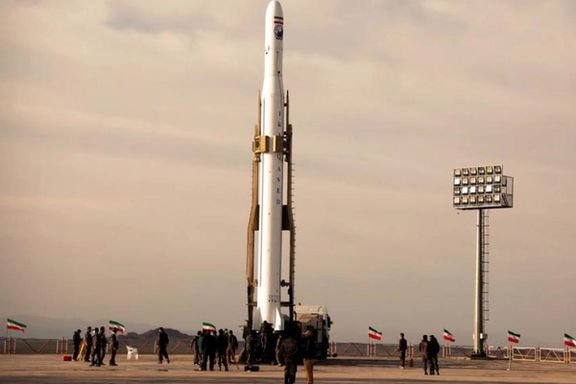
Iran’s communication minister said Saturday "there will be good news” about launching a satellite until March, after recent reports about preparations at a launch site.
The Associated Press reported earlier this week that evidence points to Iran preparing a space launch and Iranian media offered a list of upcoming planned satellite launched.
In his first press conference, communication minister Issa Zarepour said that Iran’s space program was put on the backburner during former president Hassan Rouhani’s eight-year administration (2013-2021), but now its budget has increased. He added that the country needs a ten-year plan to expand its satellite program to put vehicles at a higher orbit.
Currently, Iran can reach 500 kilometers into space, which is considered a lower orbit. President Hassan Rouhani ordered officials to aim for the 36,000-kilometer orbit and increased the space program budget up to 12 times.
Foreign observers and governments have charged that Iran's space program is a cover to justify its testing of ballistic missiles. Israel and the United States have said that Iran's space program is against a UN resolution banning Iranian missiles with nuclear weapons capability.

A firebrand senior cleric, and father-in-law of Iran's President Ebrahim Raisi, has called for the “summary trials” of journalists "who echo the ideas of enemies”.
In his Friday Sermon in Mashhad on Friday, Ahmad Alamolhoda, who is a stauch supporter of Supreme Leader Ali Khamenei, accused some of the media in Iran of taking advantage of “freedom of expression”, aiding the enemies of the Islamic Republic, and trying to obstruct the propagation of Islam.
Meanwhile he called on Iranian journalists to propagate Shiite Islam following orders by Supreme Leader Ali Khamenei. Elsewhere in his speech, Alamolhoda said that "The enemies are using their media arsenal to advocate ignorance and to create chaos that would pave the way for their onslaught."
Alamolhoda said the media are trying to distort reality and while it was the West that withdrew form [the nuclear] deal with Iran, the media affiliated with the enemies are trying to portray the case in a way that would lead to the condemnation of Iran." He added that those who echo the enemy's statements in the press and social media are infiltrators who should be put on trial as the enemy's fifth column."
Iran’s hardliners often regard most criticism about domestic and foreign affairs, as well as defense of social and political rights as incendiary, although media in Iran is tightly controlled and hundreds of journalists have been jailed throughout the 43-year existence of the clerical regime.
Meanwhile, Iran’s state TV and Tasnim news agency were forces to slam another cleric and a member of parliament who tried to deny his controversial remarks that Iranians who do not like Islamic restrictions should leave the country.
The cleric, Seyyed Kazem Mousavi later claimed that he never made those comments, and they were fabrications by the media. However, as a tape containing his remarks was leaked on social media, the state television and Tasnim harshly criticized the cleric for portraying Islam as a fundamentalist religion that cannot tolerate modern lifestyle.
A commentator at the state TV lashed out at Mousavi and said" "Who are you to decide about whether people are or are not allowed to live in Iran. This is everybody's home, and they should live here as they like."
According to Aftab News, a moderate conservative website in Iran, Mousavi still owes an apology to Iranian journalists, adding that it is becoming a common practice among Iranian officials to attribute their own comments to the media as soon as they realize what they have said was controversial and counterproductive. "This undermines conservative politician's ethical values and is not a practice consistent with religious ethics by any standard."
The website reminded Mousavi that exposing the hypocritical behavior of politicians is one of the reasons why media exist. The website added that it was easy in the past for politicians like Mousavi to deny what they have actually said or done, and it was difficult for reporters to tell the truth to the public. But nowadays, journalists can always publish a recording of the politician's statement on social media to prove their case.
However, Aftab News added that still, some politicians try to get away with the consequences of their controversial statements or behavior claiming that they made the comment during an off-the-recordprivate conversation.
To provide an example, Aftab New shied away from quoting politicians, and brought an example about an Iranian filmmaker who called film critics idiots during a conversation with several journalist. He even insisted that reporters may quote him on that. However, when his comment became controversial, he criticized several reporters for having fabricated the comment. The website reminded that "Actual quotations remain for a long time while denials are short-lived."
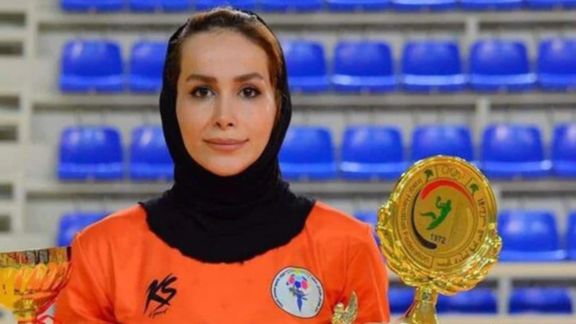
A member of the Iranian women’s handball team has confirmed that after a tournament in Spain she broke away from the team and will not return to the country.
Shaqayeq Bapiri told Voice of America in an interview on Thursday that she decided to stay in the West because of forced hijab rules in Iran and other restrictions. She disappeared from the sports camp a few days ago.
She also disclosed that each member of her team was forced to leave a 15 billion rial guarantee-of-return with Iranian authorities before travelling to Spain for the games. The money, similar to a bond, is more than $50,000 in current exchange rates, but a huge sum for ordinary Iranians. This means Bapiri forfeited the money to be able to seek asylum abroad.
She said in the interview, “We are really restricted. If the [handball] federation had not secured the 15 billion rial guarantee [from players], no one would have returned [to Iran].
Several Iranian athletes in the past two years have defected and sought asylum in other countries. Some took part in this year’s Olympics in Tokyo as non-state athletes.
In addition to dress code restrictions, another issue forcing Iranian sports people to defect is Tehran’s policy of not allowing them to compete against Israelis.
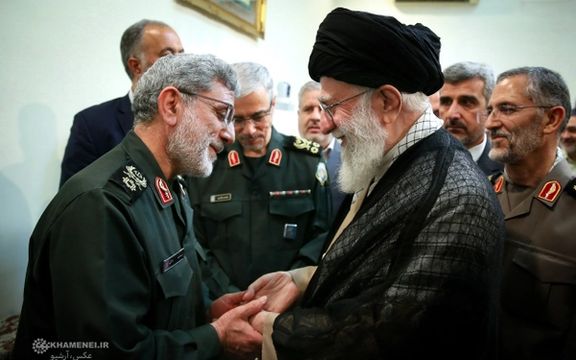
The US State Department says Iran continues to harbor al Qaeda leaders and sponsor terrorism acts, in its 2020 Country Reports on Terrorism published Thursday.
“There has been facilitation of them that allows them to remain active as leaders within the al-Qaida global enterprise,” the acting Coordinator for Counterterrorism John T. Godfrey said Thursday at a briefing introducing the 2020 report. “No secret, I think, that Iran is a longstanding state sponsor of terrorism, and I think the fact that they have enabled that leadership cadre to safely reside in Iran is a reflection of their use of terrorism as an adjunct of their foreign policy goals.”
Godfrey also said that Iran continued to support terror acts in the region “and further afield in 2020”, supporting proxies in Iraq, Lebanon, Syria, Yemen and Bahrain, including Hezbollah and Hamas.
The United States also continued high-level diplomatic contacts to counter Hezbollah’s presence in Central and South America and in Europe, resulting in nine countries taking “significant steps” in 2020 “to designate, ban, or otherwise restrict” Hezbollah.
In response to a question as to how the Biden Administration is cooperating with Saudi Arabia to counter Iranian proxy forces Godfrey said, “I think Saudi Arabia has faced a particular threat in recent years from the Houthis in Yemen, and obviously that’s a group that has enjoyed quite a bit of support from Iran, and we’ve been public about our concerns about that. And that’s something that we’ve continued to work with them on.”
However, the Biden Administration removed the Houthis from a terror designation list almost as soon as it took office in early February and since then has repeatedly condemned their missile and drone attacks against Saudi Arabia.
In the report itself, the State Department says, “The Houthis continue to receive material support and guidance from Iranian entities, including to enable attacks against Saudi Arabia. These attacks have utilized armed drones and ballistic missiles, which damaged airports and critical infrastructure.”
The report highlights the role of IRGC’s Qods (Quds) Force saying that Iran continued to acknowledge the active role the military-intelligence unit plays in regional conflicts from Iran and Syria to Yemen and elsewhere. It also says that Hezbollah “remained Iran’s most dangerous terrorist partner and the most capable terrorist organization in Lebanon, controlling areas across the country. Iran’s annual financial backing to Hizballah — which in recent years has been estimated to be in the hundreds of millions of dollars — accounts for most of the group’s annual budget.”